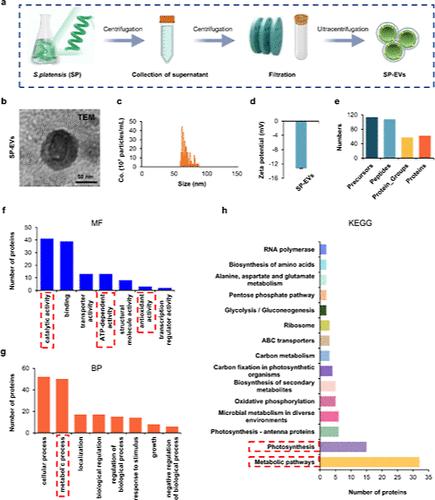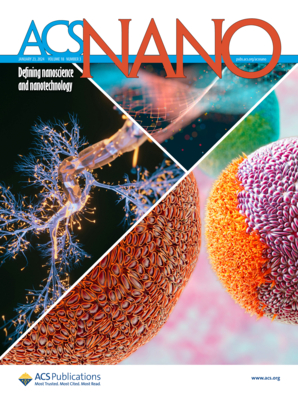Microalgae-Derived Extracellular Vesicles Synergize with Herbal Hydrogel for Energy Homeostasis in Osteoarthritis Treatment
IF 15.8
1区 材料科学
Q1 CHEMISTRY, MULTIDISCIPLINARY
引用次数: 0
Abstract
Treatment of osteoarthritis (OA) remains challenging owing to its complex pathological microenvironment, which involves reactive oxygen species, chronic inflammation, mitochondrial dysfunction, energy deficiency, and cartilage degeneration. Herein, we report for extracellular vesicles (SP-EVs) derived from the photosynthetic microorganism Spirulina platensis contain antioxidative and ATP-dependent active and metabolic-related compounds for OA treatment. SP-EVs were effectively delivered to chondrocytes, demonstrating the potential for modulating cellular communication and energy homeostasis. To facilitate sustained delivery of SP-EVs, the rhein hydrogel system was used for intra-articular injection (Rh Gel@SP-EVs), which demonstrated pH responsiveness under mildly acidic conditions and synergistic anti-inflammatory effects. Rh Gel@SP-EVs significantly rescued mitochondrial dysfunction by ameliorating inflammation-mediated oxidative stress and restoring the mitochondrial membrane potential in chondrocytes. Improved mitochondrial function facilitates the replenishment of ATP levels, further contributing to the balance of anabolic and catabolic processes within the cartilage matrix, eventually decelerating OA progression. Rh Gel@SP-EVs also modulated the Janus kinase-signal transducer and activator of transcription 3 signaling pathway, implicated in suppressing inflammatory responses. This therapeutic strategy utilized a microalgae-based herbal hydrogel system to modulate the sustained release of SP-EVs, offering an effective approach for treating OA by regulating energy metabolism and anti-inflammatory mechanisms.

微藻衍生的细胞外囊泡与草药水凝胶协同作用在骨关节炎治疗中的能量稳态
由于其复杂的病理微环境,包括活性氧、慢性炎症、线粒体功能障碍、能量缺乏和软骨变性,骨关节炎(OA)的治疗仍然具有挑战性。在这里,我们报道了来自光合微生物螺旋藻的细胞外囊泡(sp - ev)含有抗氧化和atp依赖的活性和代谢相关化合物,用于OA治疗。sp - ev被有效地递送到软骨细胞,显示出调节细胞通讯和能量稳态的潜力。为了促进sp - ev的持续递送,研究人员将大黄水凝胶系统用于关节内注射(Rh Gel@SP-EVs),该系统在轻度酸性条件下表现出pH响应性,并具有协同抗炎作用。Rh Gel@SP-EVs通过改善炎症介导的氧化应激和恢复软骨细胞的线粒体膜电位,显著地挽救了线粒体功能障碍。线粒体功能的改善有助于ATP水平的补充,进一步促进软骨基质内合成代谢和分解代谢过程的平衡,最终减缓OA的进展。Rh Gel@SP-EVs还调节Janus激酶信号转导和转录信号通路的激活因子,参与抑制炎症反应。该治疗策略利用基于微藻的草药水凝胶体系来调节sp - ev的缓释,为通过调节能量代谢和抗炎机制治疗OA提供了有效途径。
本文章由计算机程序翻译,如有差异,请以英文原文为准。
求助全文
约1分钟内获得全文
求助全文
来源期刊

ACS Nano
工程技术-材料科学:综合
CiteScore
26.00
自引率
4.10%
发文量
1627
审稿时长
1.7 months
期刊介绍:
ACS Nano, published monthly, serves as an international forum for comprehensive articles on nanoscience and nanotechnology research at the intersections of chemistry, biology, materials science, physics, and engineering. The journal fosters communication among scientists in these communities, facilitating collaboration, new research opportunities, and advancements through discoveries. ACS Nano covers synthesis, assembly, characterization, theory, and simulation of nanostructures, nanobiotechnology, nanofabrication, methods and tools for nanoscience and nanotechnology, and self- and directed-assembly. Alongside original research articles, it offers thorough reviews, perspectives on cutting-edge research, and discussions envisioning the future of nanoscience and nanotechnology.
 求助内容:
求助内容: 应助结果提醒方式:
应助结果提醒方式:


